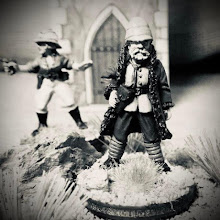Somewhere over the years I lost the original version but purchased the republished edition by Avalon Hill sometime in the mid-eighties. The Avalon Hill version is the same except they changed the classes of the warships to take advantage of Star Wars. I'm sorry, I still can't call the big ships Death Stars; they will always be the Dreadnought class of warships to me. And here we are in 2017 and I still play the game with my Honorable Sons.
The current version, showing some wear and tear as the red green and blue fleets have started to explore and colonize.
As you have already guessed by the pictures, the board is a hex grid
map, with some hexes containing stars of varying colors. Stars in a
hex may have planets that are suitable for a planet colonization which
is determined randomly by drawing a card of the star color.
I off course commanded the Scorpian Federation (we are peaceful - honest!)
Would this face lie to you?
Handy reference chart for each player also helps keep track of
your Task Forces when it is time to put the whammy on the other players.
At the beginning of a game, each player starts
in an opposite corner of the board, each with a number of markers that
represent ships of various types. For the first four turns the corner
square counts as a populated planet. In addition, all ships may move
only two spaces, but it is possible to purchase movement upgrades that
improve the rate of travel speed.
Two Yellow Star cards.
Units must follow the quickest path to
a named destination, and their destination can be changed only when the
route causes the unit to stop on a star hex. The distance that ships of
any type may travel will not precede more than eight hexes away from a
populated planet that is owned by the same player; this limitation can
be rescinded by research.
From top to bottom left to right: Task Force marker, Command Post, Scout ship, Fighter, Corvette, Deathstar Dreadnought, and enough colony transports to move 10 million people.
Research points can be spent on warships, speed, missile basis,
industrial capacity and weapons research. Every four turns a
"production phase" occurs in which planetary
populations increase by one-fifth their current population number. Any
player may move population units into Colony Transports as they expand
through the stars and inhabit other planets. What is great about the
game is "hidden" units as the tiles are not turned over unless opposing
players are in the same star hex (no battles in deep space - only in a
solar system!). Is that single tile heading toward your planet
squadrons of capital ships and escorts or only one scout ship?
With three interstellar empires in our latest game there was a lot of wheeling and dealing as each of us made treaties, ultimatums and eventually all out attacks!
Honorable Son #4's (The Engineer) spouse gives him some much needed advice.
If you cross this line line, the wrath of the Scorpian Federation will descend!
Where's the Kaboom? There was supposed to be an earth shattering Kaboom!
The Red Forces led by me help rush to take advantage of losses on both sides.
Combat is abstract but quick and bloody.
After "40 years" whichever side has the most Terrain type and
Sub-Terrain type planets is the winner. The biggest and baddest fleet
doesn't hurt either.



















Fond memories of the original Stellar Conquest. I picked up the zipped lock baggie version when it first came out. I now play GMT Space Empires 4X.
ReplyDelete